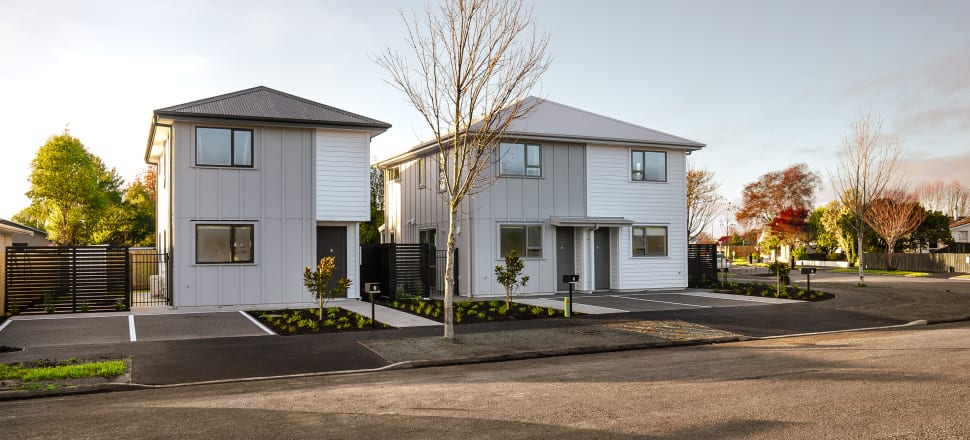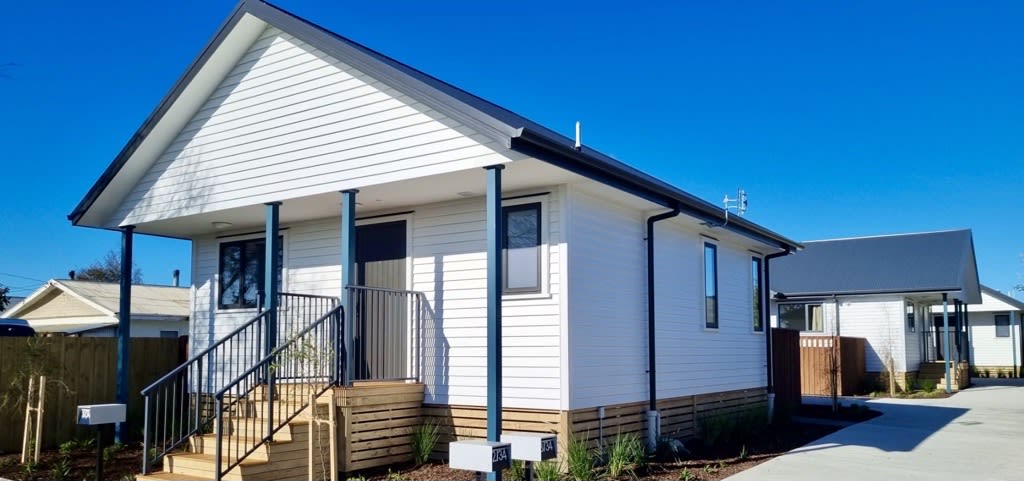
Kāinga Ora is stepping up its plan to reduce build times and cut waste, with builders and suppliers impressed at what the housing agency has so far delivered
The Government’s public housing department is about to begin a procurement pilot, in an effort to further reduce costs and speed up its delivery of houses.
In mid-2020 after a directive from Government to significantly scale up its build program, Kāinga Ora embarked on Project Velocity – a serious effort to figure out how to get better houses over the line quicker and cheaper.
It found fundamental problems were holding the sector back, particularly the fragmentation of labour and materials, siloed technical knowledge and an acceptance of poor quality work.
READ MORE: * Government pulls a u-turn on controversial housing directive * Builders’ plea to next government: Stop boom-bust cycle
To combat this, Kāinga Ora developed what it refers to as the Housing Delivery System, which primarily front-foots logjams by getting everyone around the table at the beginning of a project, to make it clear exactly what is required of each party and when – sometimes down to the hour.
What it means is design plans are ready faster, and delivered to councils ready for sign off. Tradespeople, for example, are booked in well in advance because they can be sure the site will be ready for them.
It has reduced build times dramatically.
Using Kāinga Ora’s own figures, previously the pre-construction phase would take, on average, close to 18 months, the consenting process would take another seven months and then finally another eight months for construction.
Under the new system, the homes so-far built have taken about a month in the pre-construction phase, up to a month (depending on the council) for consent, and then about a four-month build time.
That's a timeframe difference of just over two years.
Jennian Homes Christchurch operations manager Paul Jenkins said working with Kāinga Ora on a build under the new model was eye-opening.
“They’re making the industry in Christchurch better, in my opinion, they’re doing best practice, they’re making us accountable for what we do … personally I think it’s industry leading.”
He said what made things run more smoothly was having those clear lines of accountability and everyone knowing what was expected of them from the outset.
“For a standard build with Jennian we've got 82 tasks that are critical for us to build a house. With Kāinga Ora I've got 196 so you have actually doubled the level of detail.
“It definitely set targets, but you achieve results … We don't miss anything. It's all there.”
Now Kāinga Ora is looking to improve an aspect of its build process that has long been a pain point – procurement.
It is currently tendering for a 100-house build in Rotorua which it plans to use as a pilot for better ways to streamline the supply chain.
Mitre 10 chief executive Andrea Scown said it would only mean good things for suppliers.
"Getting closer to things and removing the middlemen is the best way that I could explain it.”
She said engaging suppliers earlier in the process was critical when it came to cutting waste.
"It's just minor changes to a kitchen design that could avoid the need for custom panels or materials having to be cut to size on site. Just simple things that happen that go wrong every day on every building site around the country.”

Mitre 10 has tendered for the new pilot in Rotorua, but Scown said even if it were unsuccessful, the business would benefit eventually.
"Truly partnering from the start is about actually recognising there's a whole bunch of stuff that we don't know and we don't understand, but we've got ambition to be more sustainable and complete homes faster.
“The inefficiency and the waste that's in the build of every home that gets built in this country, that's not a government issue, that's just part of how we build and just part of the sector … but Kāinga Ora have obviously done a lot of homes and they know where the opportunity is to do things smarter.”
She sees it as an opportunity for Kāinga Ora to test the waters and lead the way when it comes to constructing smarter.
Kāinga Ora Delivery Transformation general manager Matt Hulett said the contract for the pilot was still being drawn up but would expand on what the Housing Delivery System was already doing.
“It’s a new type of contract that changes the power dynamic, and it connects all of the players at a similar level.
“We're trying to make it so that the work is king and not the client. For us, from a procurement point of view, historically, projects are procured project by project, and the work that we're trying to do in this particular trial is we have over 100 homes' worth of projects sitting there and we're going to procure all 100 at one time.”
He said it would further bring together the previously fragmented and siloed aspects of a build programme.
“As we were designing the housing delivery system, it was quite interesting, a lot of our partners, whether they are consultants or build partners, hadn't met each other but they'd been working in and around projects together for a long time and they don't have a good understanding of the knock-on impacts of their performance … it's about making sure they truly understand the impact of them delivering on time and meeting the quality.
"Because you've got to remember the people that are in the sector are really, really good at doing what they do but they don't do the things that other people do – they do what they do."
Kāinga Ora is hoping these further changes to streamline work at the build end of a project will reduce completion times even more.
It has set a goal of an on-site build of 47 days, and an off-site manufacturing build to be finished within 25 days.
It is expected 9,500 total public and supported homes will be delivered in the next four years through the expedited system. The budgeted expected savings for those financial years is about $820 million.
The Government directed Kāinga Ora through its 2018 and 2020 budgets to increase the number of homes it owns by a net 11,512 homes by June 30 2024, while also renewing its aged stock of public homes. Kāinga Ora’s asset renewal programme identified 51,000 homes that should be replaced or renovated by 2035.
Kāinga Ora will also deliver a significant portion of the net additional 3,000 public homes by June 2025 that were funded through Budget 2023.
It realised simply scaling up its traditional build programme would not achieve what it had been asked to do.







